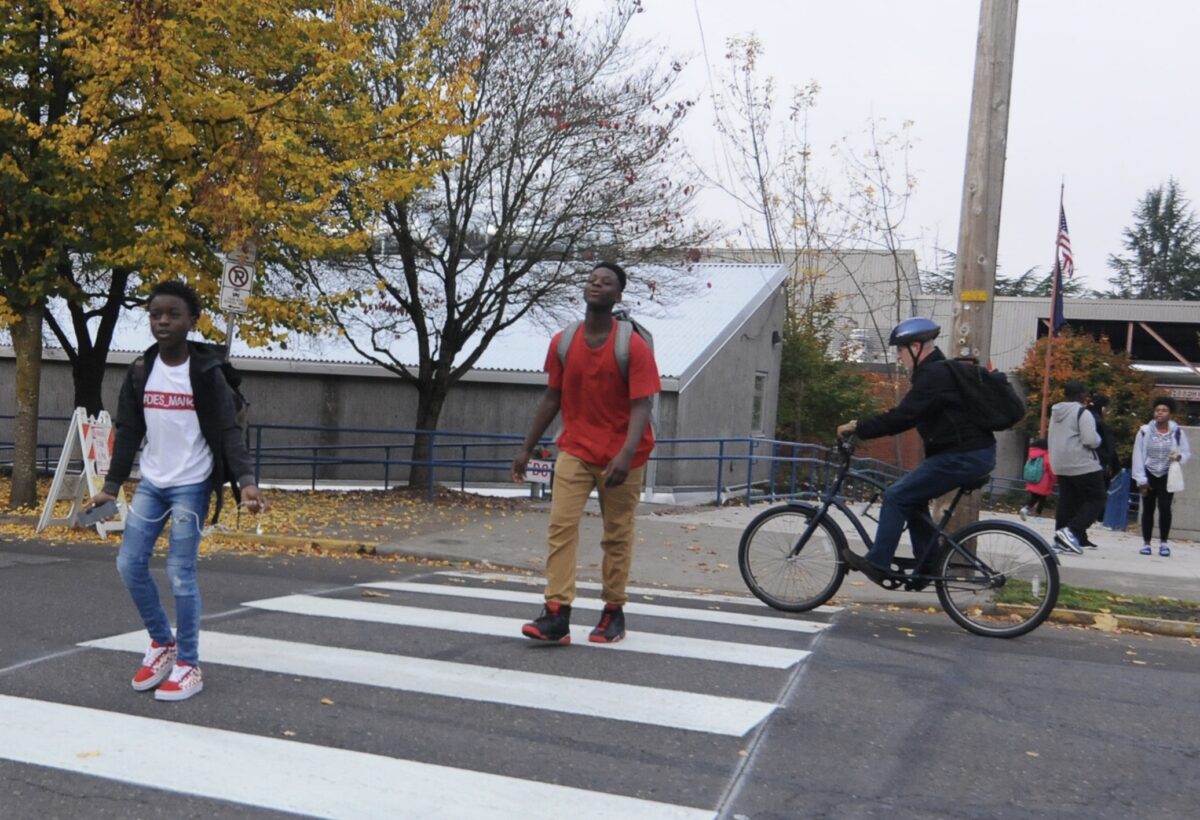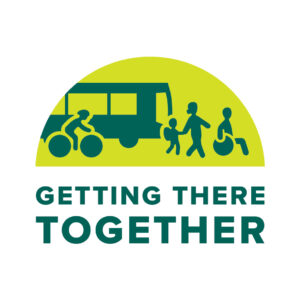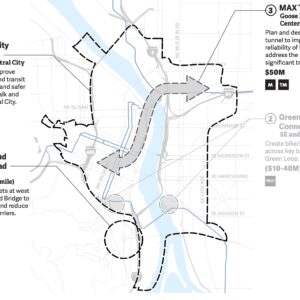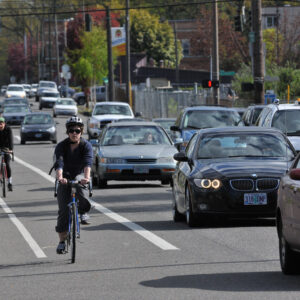
(Photo © J. Maus/BikePortland)
As Metro rumbles toward a ballot measure to raise billions of dollars for transportation projects and programs next year, polling released today shows that potential voters are ready to help pay for it.
Metro Director of Government Affairs Andy Shaw sounded pleased with the poll results during a phone interview today. “I think this is a positive result that says if we bring the right kinds of investments and outcomes in the measure, there’s a pathway to ask the voters to pay for it.”
A phone poll conducted by FM3 Research on the first week of December found solid support for a mix of new taxes and fees. Metro asked nearly 1,000 would-be voters from across the region about three combinations of potential revenue sources that included: a $50 per year vehicle registration fee, a 40-cent per $1,000 of assessed value property tax increase; a six-tenths of a percent payroll tax on businesses, and a 1% income tax increase on households that make over $100,000 per year.
The most popular option was a combination of vehicle registration fee, payroll tax and income tax that 56% of poll respondents gave some level of support to. The least popular option that included a mix of the registration fee, payroll tax, and property tax scored the lowest level of support with just 43% saying they’d be likely to vote for it. Taken by themselves, the most popular mechanism was a corporate business tax with a 59% favorability rating. The least popular was an increase in property taxes which only 31% of respondents found acceptable. (The poll has a margin of sampling error of ±3.3% and a 95% confidence interval.)
The poll released today is a follow-up to one released in October that led to headlines that voters wanted to keep widening roads.
Advertisement
With any poll, how the questions are asked can make a big difference. Shaw said Metro staff worked with the polling company and vetted the questions with groups like Getting There Together Coalition.
Here’s how they defined the measure:
“The measure would be designed to reduce traffic; create additional transportation choices for residents; reduce the pollution that causes climate change; and make earthquake safety upgrades to bridges and roads. It would fund repairs to local streets and roads; new MAX light rail and rapid bus lines; and improvements to make streets and intersections safer and make it faster for buses to move through traffic. It would raise billions of dollars over 20 years, and funding for the measure would come from…”
In addition to asking people where the money should come from, the poll asked several other questions that could influence how the package is put together.
Advertisement
Asked why they’d vote yes (487 people) or no (437 people), more supporters mentioned the need for better transit in an open-ended response than any other reason. People who voted no mentioned a distrust of government and some form of “too many new taxes” as their reason.
When asked about different types of projects were important to fund, the answers showed that 69% of respondents feel, “Improving pedestrian and overall safety on streets and roads with a history of crashes, and near senior centers, schools, and places where a lot of people walk,” is extremely, very or somewhat important. By comparison, “Making it easier and faster for businesses to deliver products throughout greater Portland,” came in at just 24% and “improvements to major intersections to ease the flow of traffic,” earned 61% favorable ratings.
As for how much the households would be willing to pay for transportation investments, $100 per year received 64% support. That figure jumped to 71% at $50 a year and decreased to 51% at $200 per year.
Even with only slight favorable majorities on some of the key questions, Shaw sees the poll as a solid green light to keep moving forward on the ballot measure. “A poll like this is sort of like dinner,” he shared with me today. “When you think of your whole dinner, people have certain type of response; but when you just talk about vegetables, they might not have the same response. Here we’re talking about different kinds of vegetables, so you expect lower results.”
Advertisement
The challenge for Metro will be to make sure the package has a mix of projects and programs that a majority of voters can get behind. Unlike successful recent transportation funding measures in other west coast cities, our region is likely to include a package that includes a wide variety of projects. There are some vehemently opposed to any new spending on roads and driving capacity increases, while others won’t support a package unless it includes more roads and lanes because of the belief that they’re necessary and they work to reduce congestion.
It’s notable that while 85% of the poll takers said they mostly drive alone, ostensibly non-driver projects that would invest in things like bike lanes, safe crossings near schools, and faster buses, received strong support.
Read more about the potential funding mechanisms (PDF) and review the full poll results (PDF).
— Jonathan Maus: (503) 706-8804, @jonathan_maus on Twitter and jonathan@bikeportland.org
— Get our headlines delivered to your inbox.
— Support this independent community media outlet with a one-time contribution or monthly subscription.







Thanks for reading.
BikePortland has served this community with independent community journalism since 2005. We rely on subscriptions from readers like you to survive. Your financial support is vital in keeping this valuable resource alive and well.
Please subscribe today to strengthen and expand our work.
Summary: people are generally fine with taxes as long as it is someone else paying them.
Well said, to a point. People oppose more taxes when they see their money going toward propping up the most bloated PERS system in the nation. When they see guys like Phil Knight getting a lower income tax rate than they have. When they see tax giveaways for everything from building never-used and unneeded buildings to boats (Yup. You can own as many boats as you want. Each one gets a tax credit.) The list goes on……
For all those who take joy on foisting more taxes on home owners, enjoy your next rent hike!
Just a reminder where your Billion Metro dollars are going on Barbur:
The SW Corridor is the biggest ticket item at $975 million. Metro says those funds could be used to build out eight projects, including “continuous high quality sidewalks, protected bike lanes and crossings on Barbur between I-405 and the Barbur Transit Center.”
I.e. nowhere.
I don’t understand your comment. Are you saying that people who live in SW Portland and southwest of Portland don’t deserve high-capacity transit – even though every other part of Portland has it? Have you seen the thousands of cars backed up on I-5 and Barbur every morning? Don’t you want to take a bunch of these cars off the road?
As much as I want HCT in SW Portland (I commuted from Tualatin to SE for several years, and now Beaverton to SE), I can’t help but lament Metro’s continued investment in the same light rail formula that has needed much improvement. It’s 2019 and Portland is a lot bigger than when Banfield LRT was built, yet we are STILL building predominantly at grade lines that are slow and prone to collisions. Even with the Portland tunnel study, which acknowledged the need for longer platforms to accommodate longer trains, we are STILL planning to build 200-ft-long platforms on this newest line, rather than future proofing it, which means we’ll have to spend more on it once (or if) the Portland tunnel does get built. This project is completely half-assed and it sucks that Metro keeps commuters hostage with an all or nothing proposal.
They want to build mediocre light rail to every sleepy suburb, instead of improving the core lines that already run through dense, high-ridership areas. If MAX were faster and more frequent, we would have more all-day riders. Metro can’t seem to get away from the weekday commuter mindset.
Every other part? My 1 hour and ten minute bus ride from St. Johns to downtown disagrees. I’d like to even get BRT, but my neighborhood isn’t wealthy enough for PBOT to do anything besides some basic maintenance
Central St. John’s to downtown is only 30 minutes on the 16 bus, compared to 20 minutes driving. That’s actually pretty good, for an 8-mile bus ride. Unless someone lives literally right next to the blue line in east Portland, they are looking at 40 to 60 minutes for a bus ride of the same distance.
A BRT line would probably only shave about 5mins off the run time for the 16. Lines like the 9, 2, 19, 20, 12 should be the priority, because they serve so many people and see extreme delays during rush hours.
The 16 is only 30 minutes if you live at the stop, which most of St. Johns doesn’t. The fastest I’ve seen from my house to downtown is 47 minutes. I don’t take the 16 because it gets me to work either extremely early or decently late, as it only runs every 40 minutes. When I don’t bike, I drive to Interstate and take yellow line because its timely.
It is what it is. TriMet barely serves the peninsula, so I don’t really blame people for driving alone to work. TriMet & Metro can continue to overserve yuppies who want to live close-in and drive their Teslas to work downtown, or they can serve under-served working class communities on the peninsula. TriMet wants to double down on yuppies. I expect we will continue to see ridership and bike numbers continue to fall as TriMet & Metro continue to chase bad money with good.
It’s surreal to me that school children have to walk across the cut on Lombard, with it’s broken sidewalks and fast, poorly lit, unrestricted speed roads, while Metro is focused on making a pedestrian crossing in Lake O that will barely be used. The rich get richer I suppose
You know it isn’t a NC transportation poll when the first 5 questions are not about building new freeways, where to put them, and what new regressive tax to pay for them. In fact, there were no open options-type questions that allowed respondents to ask for more freeways, just intersection and bridge repair.
Perhaps that’s because Metro has no authority over freeways – that’s ODOT’s territory. Why would Metro ask questions it can do nothing about?
I will vote no if funding includes property tax.
Oregon needs a sales tax. It’s a tourist state. Let tourists help pay the bills. Exempt food and medicine, and cut property taxes accordingly.
I agree.
A tax that targets tourists would be more like one on hotels, destinations, and entertainment venues.
New Hampshire has one.
“With any poll, how the questions are asked can make a big difference”
Ain’t that the truth. And they asked a NGO for input!
Now why couldn’t PBOT have done similarly on that e-scooter survey?!
But back to this survey:
“There are some vehemently opposed to any new spending on roads and driving capacity increases, while others won’t support a package unless it includes more roads and lanes because of the belief that they’re necessary and they work to reduce congestion.”
What we need here is leadership, or what is sometimes called the Bully Pulpit. Someone in authority standing up for a principle, in this case that more/wider roads in the Age Of Climate Change is doubly foolish. Because (1) widening roads does not lead to the outcomes boosters wish, and (2) any money spent on accommodating automobiles and trucks in 2020 is going to bite us in the ass w/r/t climate change.
Asking people who by and large have not been exposed to these facts is not a recipe for good policy, because they aren’t aware of the basic relationships, the underlying myopia and wishful ignorance that has guided our transportation planning for generations/ever.
In other words “I’m a progressive and know what is best for you”.
You would say that.
Why don’t you, instead of jeering, point out what I wrote that is factually incorrect. This is not about progressive or reactionary, but about evidence. Our relationship to truth is not evenly distributed. Some facts are inconvenient and so it is better to pretend that evolution or climate change or induced demand or thermodynamics or racism or inequality don’t exist or are the figment of someone’s imagination.
“People who voted no mentioned a distrust of government and some form of ‘too many new taxes’ as their reason.”
This mistrust of government presents a major challenge to any new taxes and spending. It needs to be addressed directly because it is most relevant to the persuadable “swing” voters. A 2013 survey of all Oregonians found 64% believed “government is wasteful and inefficient with our taxes and cannot be trusted to make good decisions.” A 2016 voter survey reported that respondents estimated that 44 cents out of every dollar the state spends is “wasted.” Mistrust parallels an understandable lack of knowledge regarding how our public finance system works. Polls of Oregonians also indicate a majority of respondents cannot identify the biggest source of revenue for Oregon state government; in 2012, only 31% correctly named the personal income tax a decline from 39% in 2008. Sure, many Oregonians are just anti-tax but for a significant number of “swing” voters its really about whether new taxes will be invested smartly and fairly.
How do we increase trust in how government spends tax dollars? Making smart investments that benefit the public is the obvious first answer but that’s easier said than done because enough people disagree on what investments are in the public interest. So perhaps it is enough to at least increase the transparency and accountability in the use of public funds. But how to do that?
Might more people trust more in government if public officials shared greater power over decisions as to how to spend a portion of new public money? Might the same public officials benefit from learning what their constituents would choose when give the power and responsibility to decide? Might more people get involved and learn the details if the had some real voice and vote in the process?
I just would like to get a ballot every-once in a while that didn’t include a measure, that if voted for, increases property tax. I’m usually supportive of the measures, but when it comes to transportation, I’m not so supportive of property tax increases. I’d much rather pay a fuel tax
Yeah… I was trying to make the pitch for participatory budgeting (www.pboregon.org) with out sounding too much like a broken record.
I know this will sound counter intuitive, but what Oregon and its cities need to do is a change of policy in line with the other 49 states rather than necessarily raising taxes. The gas and other transportation-related revenues need to be allowed to be added to the general fund rather than be dedicated just to transportation infrastructure.
Both Oregon and the Feds are having to deal with an unintended consequence of transportation-dedicated taxes – namely, a legislative and civic culture has been created in Oregon and its cities whereby transportation improvements are being limited by each legislature/council by how much money is available for such improvements rather than by need. As cars have become ever more efficient compared to 1956, gas tax collected has steadily declined, while inflation has reduced the value of funds collected, and the past investments made cannot be maintained just on gas tax alone, not even with vehicle tax and parking revenues added. After 45 years of failure, you should be able to see this by now.
So you as Oregon voters need to make a series of decisions. Do you continue to not raise taxes significantly and let your roads crumble and bike/ped projects not be built? Or do you redirect your very limited revenue for schools, public safely and prisons towards road projects?
And let’s be honest here, while Oregon can legally impose a statewide sales tax (which Ashland already has), it’s not going to. The last few votes were 80% against. Ditto with raising income taxes.
Amen to that. Although I think the polling indicates support for raising revenue with income taxes (especially, I would guess, a progressive one) is stronger than a sales tax.
Aside from the Arts poll tax, Portland is generally more liberal than most of the rest of the state when it comes to progressive taxes, which is typical of the largest city in any state. But given how leading most of the poll questions were, not being taxed at all wasn’t really an option on the poll – and I have my doubts that Portlanders will be willing to raise their own personal income taxes. But then again they did so in the mid 2000s with the Multnomah County income tax, so maybe they will.
I’m glad to see that you’re still politically engaged, Jim.
Vehicle registration fees have already been increased to fund Sellwood Bridge and now the Burnside Bridge. When my car is sitting in the garage, which it does for days at a time, it’s not contributing to congestion, pavement deterioration, or the need for safety improvements. Enough with the vehicle registration fee increases; the burden should be on those using the system, wearing it out, and causing safety problems. The more you use the system and less-safe-for-others (bigger) vehicles, the more you should pay. That means GAS TAX.
No, that means a mileage or usage tax. And maybe a storage tax if you use public space for parking. When the vehicle operates, the responsible user pays per hour or meter, depending on how we feel about idling without movement.
Stph
Weight x miles tax. Pay on your own estimate, reconcile at registration. Feel that’s unfair because most of those miles are out of state? Prove it. I could, because my insurer is MetroMile. Yes, I gave up some privacy to my auto insurer, but nowhere near as much as we give up through our phones.
Exactly. If you can’t prove your mileage you are charged at 15,000 miles per year, or whatever the insurance folks report as the average for your area.
Lets see: carbon emissions are going up, transit ridership is going down, congestion is up, congestion pricing is nowhere to be seen, and Metro wants us to discuss how to pay to add to the system that is currently delivering these results. Instead, Metro should be asking us to discuss what kind of system would deliver different results. Unfortunately, they’re only interested, apparently, in expanding the legacy system with all its warts. This is wrong in so many ways.